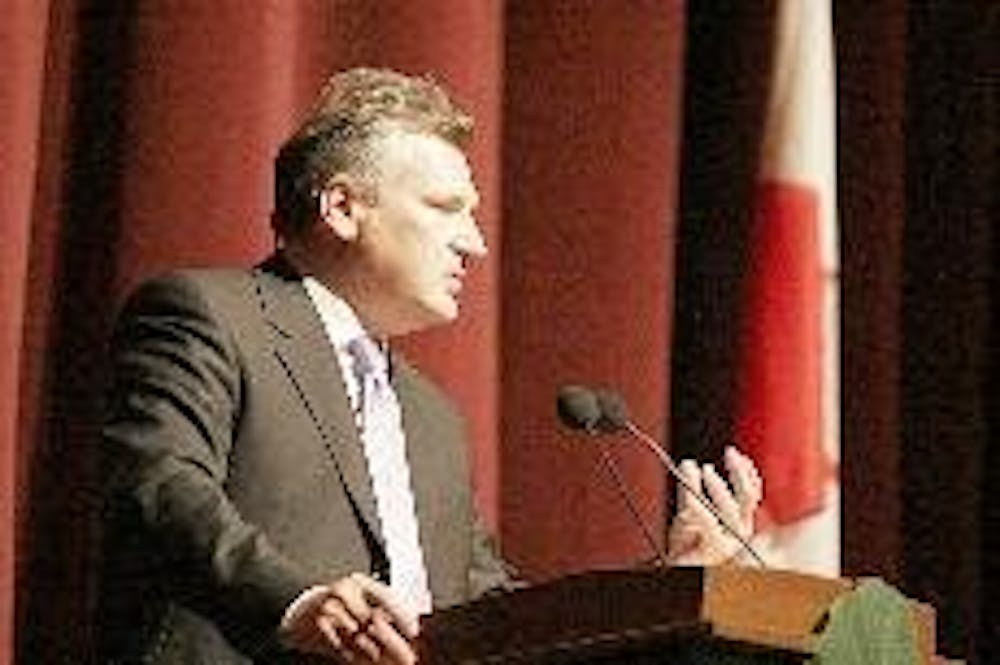
Former Polish president Aleksander Kwasniewski speaks on Poland's (Michael Pickering)
Change can happen - that was the message former president of Poland Aleksander Kwasniewski told students, faculty and community members Wednesday afternoon.
"If you're in politics and you are tired, frustrated (and) you don't believe in the good," Kwasniewski said to a full house in Hall Auditorium. "(Then) Central and Eastern Europe are good examples that anything can happen."
Kwasniewski is quite familiar with change, being president of Poland for two terms from 1995-2005 and experiencing the country's transformation from a communist-controlled state to a democracy. Kwasniewski saw his country enter both the North Atlantic Treaty Organization (NATO) and the European Union. And on a personal level, Kwasniewski knows about changing professions - before entering politics, the former president was editor-in-chief of two Polish newspapers: a weekly student newspaper from 1981-84, and from 1984-85 of the daily Sztandar Mlodych.
Yet in his "Transforming Central and Eastern Europe: Experiences and Perspectives" lecture, Kwasniewski mainly focused on the significance of the changes his country made since 1991, when Lech Walesa became president and the country held its first parliamentary elections following communist rule.
James Brock, professor of economics at Miami University, had the former president attend his upper-level economics and government policy class Thursday, Feb. 15 said that Kwasniewski's experiences were of great importance to not only what his students were studying, but to Europe as a whole.
"(Kwasniewski was integral to) the monumental economic reconstruction Poland has gone through the last 10 years or so," Brock said.
In his speech, Kwasniewski highlighted the "soft change of a political system" that Poland experienced moving away from communism, in reference to more violent changes that other Eastern and Central European countries experienced. He referenced, in particular, the series of round table talks in 1989 that he participated in with other leaders from Polish political parties to work to transform the country from communist rule to open elections.
"(The series of round table talks) was an extremely important concept for the transformation of Central and Eastern European countries," he said. "(It was) without tensions, without conflicts, without revolutions, without blood, without victims."
Yet Kwasniewski moved beyond the past in his lecture, and spoke on the current state of Poland and the war in Iraq. Kwasniewski said that he did, and still does, support President George Bush's plan to invade Iraq. However, now, the former president said he may support what he calls the controversial plan to divide Iraq in three sections, in order to reduce secretarian violence.
Kwasniewski said that now he has the liberty to speak frankly about such issues, as he is out of office.
Enjoy what you're reading?
Signup for our newsletter
"I can speak so because I am a former president," Kwasniewski said. "If I did when I was in office, it would have been a disaster."
The former president also had great hope for the future of Poland, even though it does have its problems - namely unemployment and underdeveloped regions, he said.
Miami senior Gabriela Tennhard thought that the former president did not focus enough on these topics and referenced her personal experiences being in Poland. Tennhard is from Dresden, Germany, and not far from the border of Poland. She said that Poland still very much has its problems, such as illegal labor, and has a far way to go in terms of economic development.
Yet she agreed with Kwasniewski on one issue - the hope in future generations.
"The young generation is extremely driven, open," Tennhard said. "They embrace U.S. (and) German culture."
Kwasniewski was brought to Miami by the Farmer School of Business and Alan Oak, assistant dean for external relations for the business school, explained the importance of having such speakers of
such international prominence come to Miami.
"Students must be more culturally aware and savvy ... both from an economic and social perspective," Oak said.
The Havighurst Center for Russian and Post-Soviet Studies and in particular Marek Dollar, the Honorary Consul of the Republic of Poland in the U.S., also contributed to bringing Kwasniewski to Oxford.
President David Hodge, at the conclusion of the speech, awarded the former president with the Miami University Presidential Medal, an award that Hodge said is rarely given and whose recipients must exhibit an extraordinary impact on the community. Kwasniewski was the second president of Poland to receive this metal, as Lech Walesa visited Miami in 1999 and was awarded the medal by former Miami President James Garland.
Following the speech, Hodge said that the former president was simply "full of life."
"I was deeply impressed by his spirit, tremendous optimism for the future," Hodge said. " ... He is a remarkably inspirational individual."
Hodge wasn't the only one who shared these sentiments. As he was leaving Hall Auditorium, Kwasniewski stopped for multiple pictures with students and community members, shaking hands and greeting the crowd that formed around him.
Toward the end of his speech, Kwasniewski left students and those in attendance with a word of advice for learning about Eastern and Central Europe: See it firsthand.
"You have to visit these places because you will see how possible a deep change is," he said.




